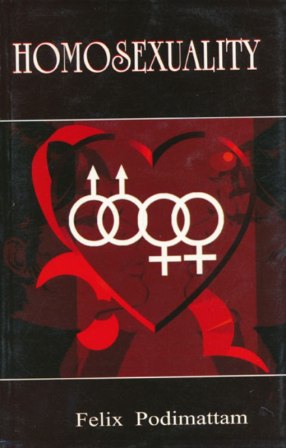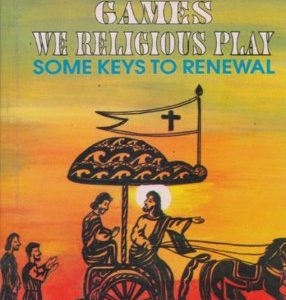Description
HOMOSEXUALITY
Of all the difficult problems which confront priests and others of the “care-taking” profession, homosexuality stands high on the list. Although the problem is as old as recorded history, efforts to understand and treat the disorder seem to have been ^poradic and few. Homosexuality itself is not a new issue. Homosexual practices ^ were known already in the ancient world.
In the mordren times homosexuality has got a new colouring. The new social context has witnessed an increasing number of persons who have not only “come out of the closet” and publicly affirmed their sexual preference but also actively assert that homosexuality as a sexual preference stands on equal footing with heterosexuality. Gay activists now demand that society not only tolerate homosexual acts, but accept the homosexual orientation as a legitimate alternative lifestyle.
The new social context in which homosexuality is put forth as a lifelong orientation and as an alternative way of sexual expression presents a formidable challenge to the development of a Christian sex ethic. Gay activism raises a crucial ethical question: Is the widely held rejection of the homosexual lifestyle valid, or is this outlook sorely in need of revision at this point of time?
It is obvious, therefore, that for many reasons there is a need for this book, a need to have the problem delineated and defined, a need especially to advice priests as to what to do and what not to do upon encountering the problem and in counseling the hapless individuals who appeal to them for help. This book attempts to provide the information which is needed to answer some of the questions in the area of homosexuality. It makes no attempt to tell all that is known about homosexuality. No effort has been made to exhaust the subject, but I hope that a fair cross section has been presented.
Dr. Felix Podimattam is one of the best-known moral theologians in India and outside. Besides his full time job as a professor, he finds time to write books at an amazing rate. He has ^E^Jto authored 65 books. Besides his Master’s degree in Political I Science from the University of Mysore, he holds a Licentiate in Theology from the Pontifical Gregorian University, Rome, and subsequently a Doctorate in Moral Theology from the Alphosian Academy, Rome, His post-doctoral studies were pursued in Washington, DC, U.S. A. At Present he is professor of moral theology at St. Francis Theological College, Kottayam, Kerala.
CONTENTS
INTRODUCTION
CHAPTER ONE. NATURE OF HOMOSEXUALITY
1. Description of Homosexuality
Constitutional Homosexuality
Behavioral Homosexuality
2. Misconceptions regarding Homosexuality
3. Incidence of Homosexuality
4. Causes of Homosexuality
5. Change of the Homosexual Orientation
6. The Lifestyle of Homosexuals
7. The Society from the Homosexual’s Viewpoint
8. Homosexual Men as Compared with Heterosexual Men
9. The Advantages of Male Homosexuals
10. The Disadvantages of Male Homosexuals
11. The Difference between
Male Homosexuality and Lesbianism
12. Lesbians and Heterosexual Sex
13. Gay Liberation Movement
14. Homosexuality and Marriage
15. The Indian Situation
CHAPTER TWO.
MORAL ASPECTS OF HOMOSEXUALITY
1. Moral Aspects of Constitutional Homosexuality
2. Moral Aspects of Behavioral Homosexuality
2.1. Official Teaching of the Church
2.2. Evaluation of the Official Teaching of the Church
CHAPTER THREE.
MORAL ASPECTS OF BEHAVIORAL HOMOSEXUALITY:
THE RADICAL APPROACH
1. Claim of the Radical Approach
2. Weakness of the Radical Approach
CHAPTER FOUR.
MORAL ASPECTS OF BEHAVIORAL HOMOSEXUALITY: THE RIGID APPROACH
1. Claim of the Rigid Approach
2. Weakness of the Rigid Approach
2.1. Inadequate Interpretation of Scripture
2.2. Defective Understanding of Tradition
2.3. Faulty Character of Theological Reasoning
2.4. The Use and Abuse of the Language
of “Natural” and “Unnatural”
2.5. Celibacy and Abstinence is No Solution for
Most Homosexuals
2.6. Can Grace Do All Things? CHAPTER FIVE.
MORAL ASPECTS OF BEHAVIORAL HOMOSEXUALITY: THE MODERATE APPROACH
1. Homosexual Acts are Always Evil
2. Not Every Form of Homosexual Expression is Necessarily Sinful
2.1. Support from Scripture
2.2. Support from Contemporary Theologians
2.3. Support from Protestant Churches
2.4. Support from Hinduism and Islam
2.5. Support from the Experience of Responsible Homosexuals
2.6. Support from Theological Reasons
No Intrinsic Relationship between Sex and Marriage
What is Homosexual Behaviour is Differently Understood
Possibility for Two Actions Which Have the
Same External Structure to Be Objectively Morally Different
Parallel between Sexuality and the Christian Faith
In a Sense, We Should Speak of Sexual Moralities in the Plural
Application of the Principle of Lesser Evil
Application of the Principle of the Practical Ideal
3. The Morality of Bisexual Acts
CHAPTER SIX. PASTORAL ASPECTS OF HOMOSEXUALITY
1. Avoid Homophobia
2. Develop the Correct Christian Attitude
3. No Penalization of Homosexuals
4. Homosexual Marriage
5. Homosexuality and Vocation
6. Pastoral Tips CONCLUSION BIBLIOGRAPHY ENDNOTES INDEX




Reviews
There are no reviews yet.